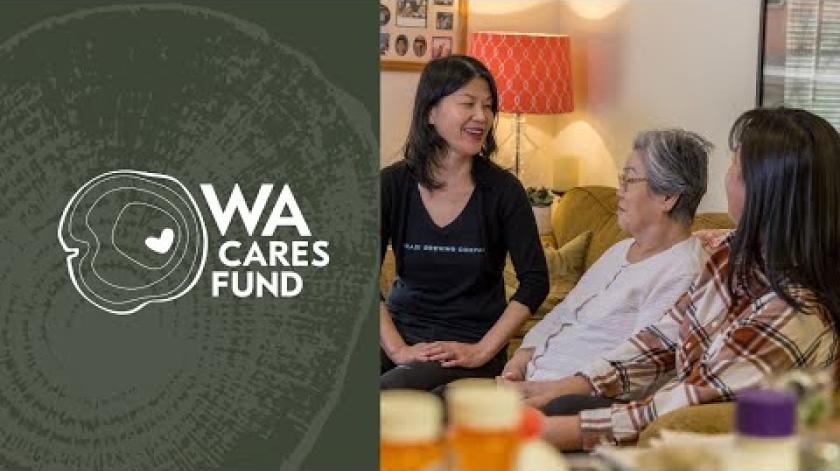Sun-Hee and Yunhee are sisters and nurses living in the Puget Sound area. They provided care for their dad until he passed away from Alzheimer’s disease and are now starting the long-term care journey anew with their mom, who has begun experiencing cognitive decline at the age of 84.
Sun-Hee says after taking care of their dad, seeing similar symptoms in their mom has been devastating. “A program like WA Cares is good for the whole family, not just for the loved ones we take care of, but the affected caretakers too,” she says.
After immigrating from Korea to the United States in the mid-1970s, Sun-Hee and Yunhee’s parents worked hard to achieve their version of the American Dream – raising three children, owning a home and running a business together.
When their dad received his Alzheimer’s diagnosis, both Sun-Hee and Yunhee worked as full-time nurses, but neither specialized in geriatric care nor knew the best way to track down long-term care resources. “Those skills I learned over the years as a nurse definitely helped with caregiving. But emotionally and mentally it was hard,” says Yunhee.
Now that their mom is experiencing cognitive decline, Sun-Hee and Yunhee have begun caring for her in similar ways. The sisters take turns spending the night with their mom, who lives in the independent senior living apartment complex. They cook her Korean food and help her take her medication, grocery shop, clean her apartment, and keep a daily routine. Yunhee notes, “The caregiving brings back a lot of memories of growing up and her taking care of us, showing us things, learning skills from my mom.”
They acknowledge that the cost of care – both the financial and emotional toll – has been high, and that their parents’ careful saving habit was an important reason they had choices when it came to long-term care for their dad. Both Sun-Hee and Yunhee have stepped away from their nursing careers to spend more time with their mom.
According to Yunhee, “It was what I needed to do to support my mom and my sister, so we could both care for her in the way we wanted to, but I definitely felt it financially.” She continues, “She's our mom. There's nothing I wouldn't do for her. She was there for us when we were growing up. She sacrificed for us, and I want to do that for her — take care of her the way she took care of us — to the best of my ability.”
Sun-Hee says their help with daily tasks is necessary to ensure their mom stays as independent as possible. “We want her to be safe, happy and content. But we haven't been working during this time, so we have zero income. A resource like WA Cares would be so helpful in easing that financial aspect. Having additional resources to choose a caregiver who is culturally appropriate and who we trust and [our mom] trusts would give us a little bit of respite. For sure, I could not do this without my sister.”
Sun-Hee is glad to see Washington is making long-term care support available to more people in the state. “Whether you're younger or older, to have a resource like that and to know that the state is investing in families and taking care of families – it means a lot to me to live in a state that is going the extra mile. It gives me hope, and that's all you need sometimes.”
Sun-Hee says pathways to care are different for different families and cultures, but a program like WA Cares will help all of us. “It'll be there for families in whatever capacity they need. WA Cares will benefit everyone.”
